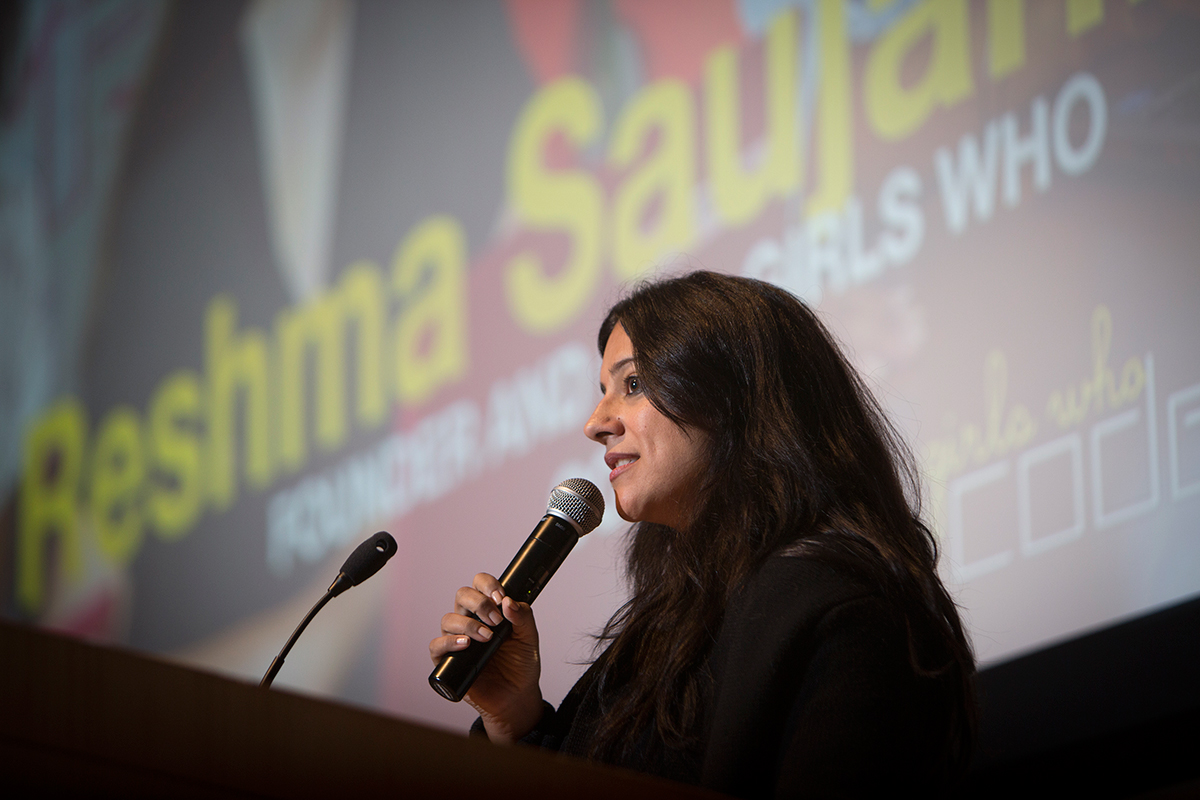Girls Who Code CEO seeks to empower women in tech
By Robert Johnson

Reshma Saujani, founder and CEO of Girls Who Code, delivered the 2015 Iscol Family Program for Leadership Development in Public Service Lecture Oct. 7 to a crowd of students, faculty and community members on campus.
Her talk, “Workforce of the Future,” explained the gender gap between men and women in the fields of technology and engineering, highlighting important consequences and possible solutions.
Saujani’s parents came to America as refugees, exiled from Uganda in the 1970’s. In pursuit of the American Dream her parents instilled in her, Saujani graduated from Yale Law School and became a lawyer in New York City.
After watching Hillary Clinton’s concession speech in 2008, Saujani was inspired to leave her career in the private sector to launch her own congressional campaign. Running against an 18-year incumbent in the 2010 Democratic primary race for the U.S. House of Representatives, Saujani became the first Indian-American woman – as well as the first South Asian woman – to run for Congress. Though she lost, her experiences campaigning brought to her attention the glaring gender gap in the tech and engineering fields.
“As I went from school, to school, to school, I would see 100 boys clamoring to be the next Steve Jobs or Mark Zuckerberg … but I didn’t see any girls,” Saujani explained. “This question of ‘where are the girls?’ – which then became an obsession – is what led me to start Girls Who Code.”
Girls Who Code is a national nonprofit organization working to close the gender gap in technology. Since its founding in 2012, it has served 3,331 girls in 24 states. The organization has two major programs: a 7-week summer immersion program and the Girls Who Code Club program, both of which bring high-quality computer instruction, mentorship and career preparation to young women interested in computer science and technology.
To make her case for why gender parity is so important in the tech industry, Saujani focused on three main points: access to jobs, pay equity and the value of adding new perspectives.
Today there are 5 million open jobs, more than at any time since 2011, she said. About 15 percent of those jobs are in tech, and two-thirds of these jobs are in nontraditional industries like financial services and healthcare. By 2020, it is expected 1.4 million jobs will be open in computing related fields. Approximately 29 percent of those jobs are expected to be filled by U.S. graduates, but only 3 percent of them are projected to be filled by women.
This is of tremendous importance when considering the persistent problem of pay equity between men and women in our society, Saujani stressed. Women employed in science, technology, engineering and mathematics (STEM) jobs earn over 33 percent more than their peers in non-STEM fields.
“There is no pay gap for computer scientists and engineers,” she said.
Saujani maintained that we must change our culture. “Why is it okay that we allow our girls to say that they hate math, when we would never allow them to say that about reading and writing? We have allowed girls to think that it’s okay to not go into the math or sciences even when they are interested our passionate,” she said.
“In 1984, about 37 percent of all computer science graduates were women,” Saujani said. “If you were to pull up a picture of Steve Jobs’ original Apple team, there was almost half women.” Today, less than 18 percent of computer science graduates are women. “At a time when we’ve become more and more reliant on technology, we’re pushing women out,” she lamented.
As of 2014, 90 percent of Girls Who Code alumnae are majoring or minoring in computer science. Yet 77 percent of them wanted to major in something else before going through the program and 92 percent of alumnae reported having taught code to someone else. “Having role models is really important – you cannot be what you cannot see,” Saujani said.
Saujani asserted that fostering gender parity in the technology and engineering fields is imperative to ensure America’s continued role as a global leader in technological innovation.
The College of Human Ecology's Bronfenbrenner Center for Translational Research hosted the event.
Robert Johnson ’17 is a writer intern for the Cornell Chronicle.
Media Contact
Get Cornell news delivered right to your inbox.
Subscribe